GEOP3040 Reflective Log: Critical Analysis of Asia-Pacific Development
VerifiedAdded on 2022/09/26
|10
|2193
|35
Homework Assignment
AI Summary
This reflective log assignment, completed by a student, provides a week-by-week analysis of readings related to Asia-Pacific development. The log begins by summarizing key points from McGregor, Law, and Miller's chapter on Southeast Asian development, highlighting the region's diversity, economic disparities, and the common aspiration for development. It further explores McGregor's work on post-development theory, Allen's analysis of violence in Melanesia, and Sultana's examination of gender and water in Bangladesh. The log also covers Li's discussion on community forest management and Gibson et al.'s examination of community economies in Monsoon Asia. Each week's summary includes reflections on the readings and connections to contemporary events. The assignment demonstrates critical reading, reflection, and analytical skills, offering valuable insights into the complexities of Asia-Pacific development, including issues of economic disparity, cultural diversity, violence, gendered spaces, and community-based approaches to resource management and economic practices. The references cited support the analysis.
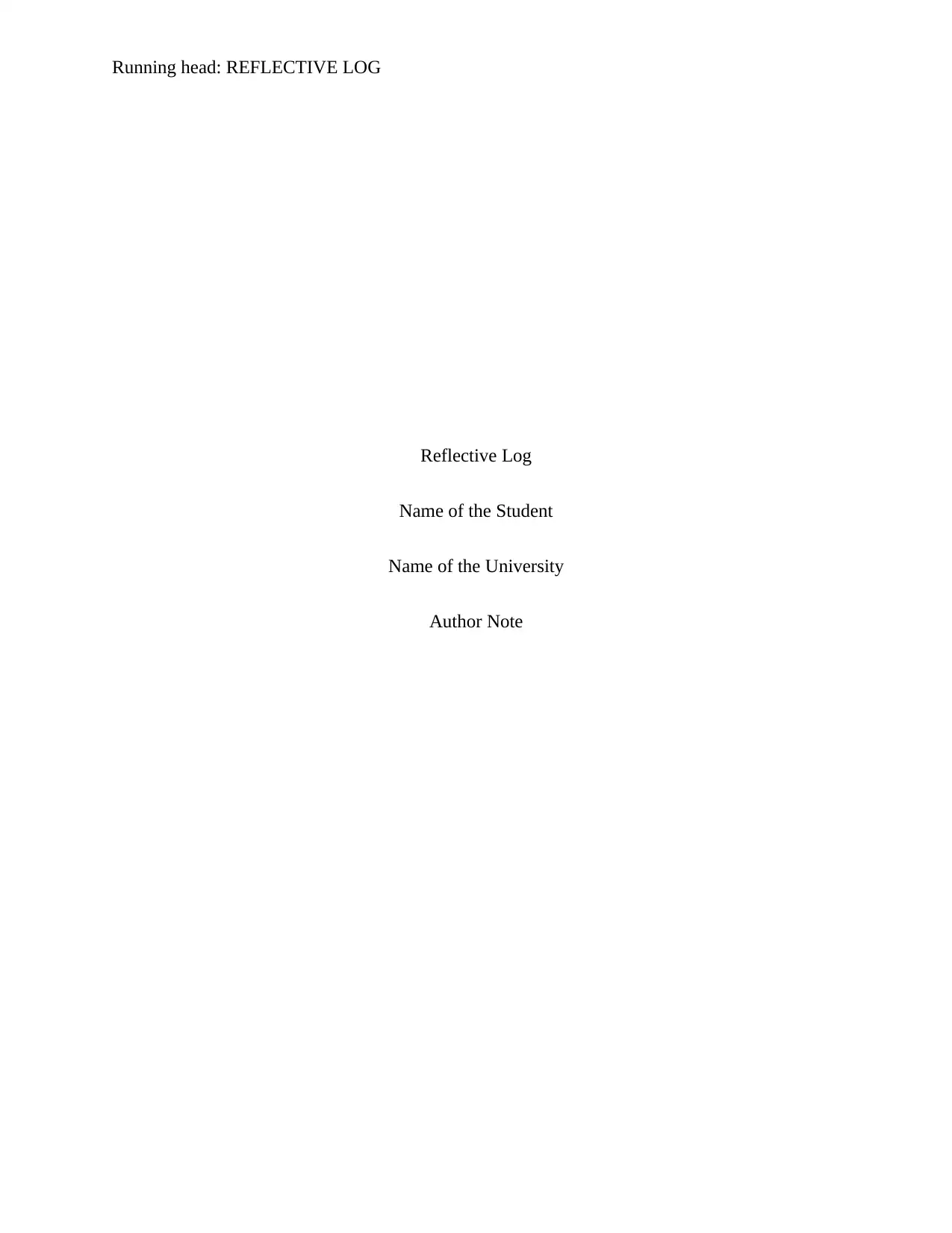
Running head: REFLECTIVE LOG
Reflective Log
Name of the Student
Name of the University
Author Note
Reflective Log
Name of the Student
Name of the University
Author Note
Paraphrase This Document
Need a fresh take? Get an instant paraphrase of this document with our AI Paraphraser
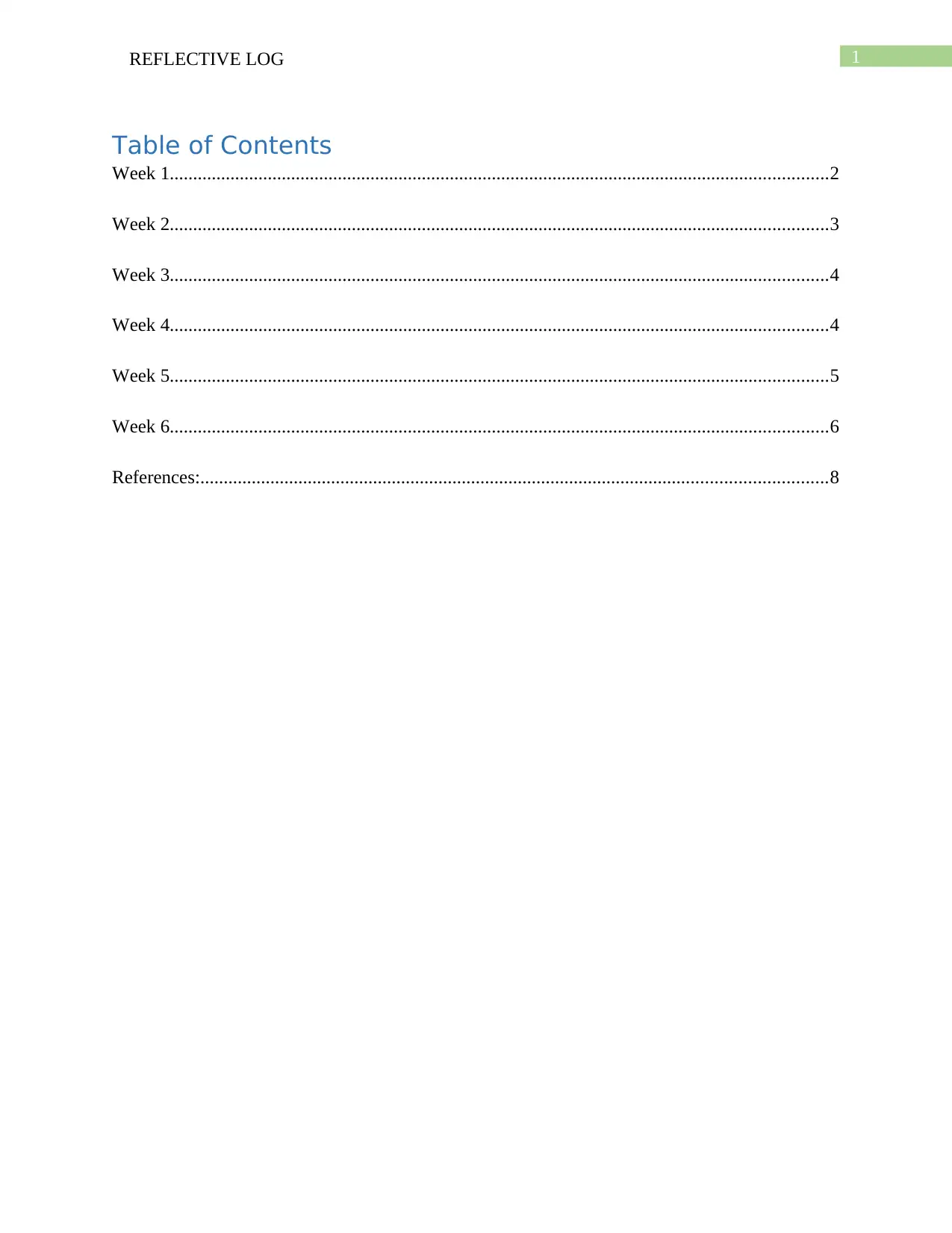
1REFLECTIVE LOG
Table of Contents
Week 1.............................................................................................................................................2
Week 2.............................................................................................................................................3
Week 3.............................................................................................................................................4
Week 4.............................................................................................................................................4
Week 5.............................................................................................................................................5
Week 6.............................................................................................................................................6
References:......................................................................................................................................8
Table of Contents
Week 1.............................................................................................................................................2
Week 2.............................................................................................................................................3
Week 3.............................................................................................................................................4
Week 4.............................................................................................................................................4
Week 5.............................................................................................................................................5
Week 6.............................................................................................................................................6
References:......................................................................................................................................8
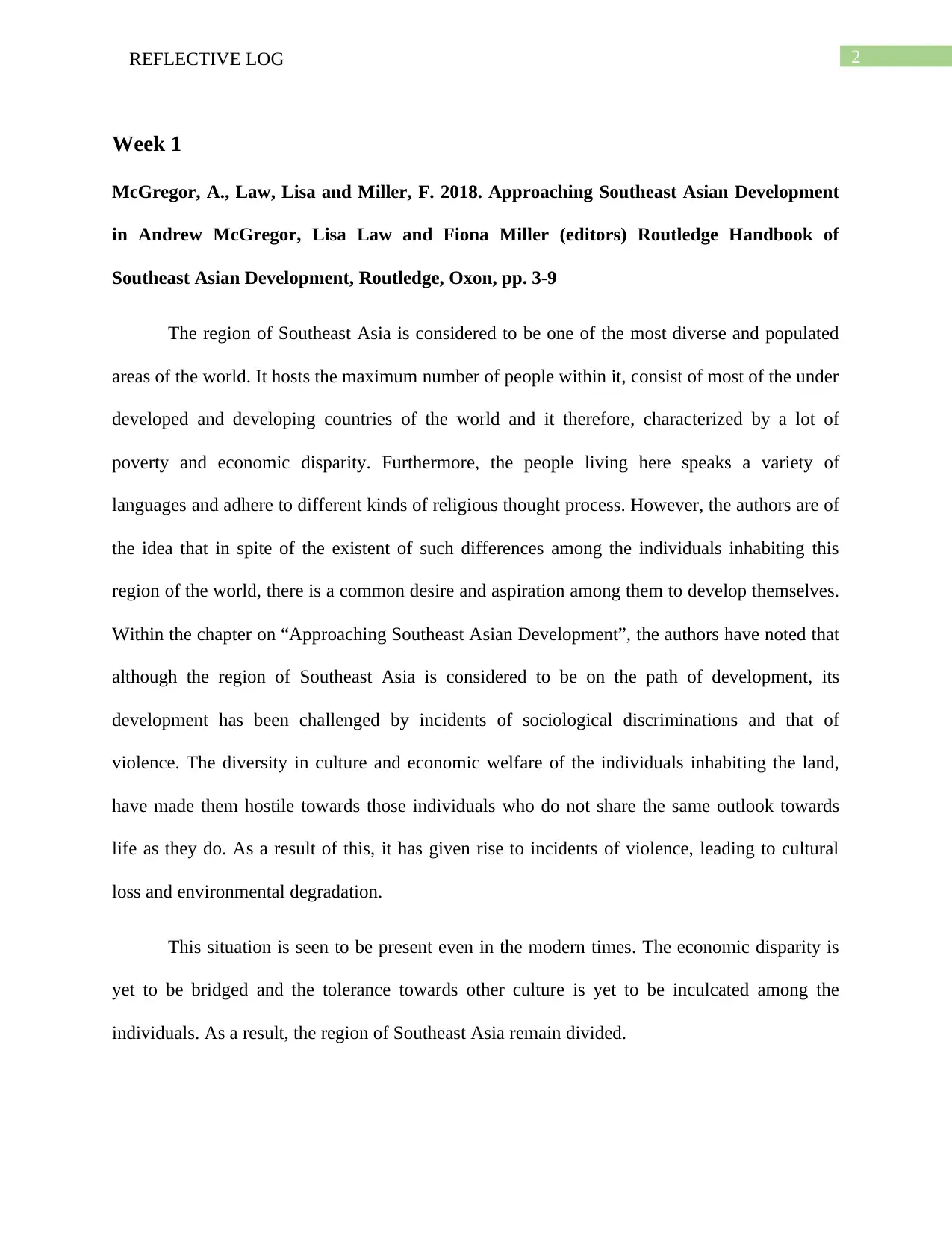
2REFLECTIVE LOG
Week 1
McGregor, A., Law, Lisa and Miller, F. 2018. Approaching Southeast Asian Development
in Andrew McGregor, Lisa Law and Fiona Miller (editors) Routledge Handbook of
Southeast Asian Development, Routledge, Oxon, pp. 3-9
The region of Southeast Asia is considered to be one of the most diverse and populated
areas of the world. It hosts the maximum number of people within it, consist of most of the under
developed and developing countries of the world and it therefore, characterized by a lot of
poverty and economic disparity. Furthermore, the people living here speaks a variety of
languages and adhere to different kinds of religious thought process. However, the authors are of
the idea that in spite of the existent of such differences among the individuals inhabiting this
region of the world, there is a common desire and aspiration among them to develop themselves.
Within the chapter on “Approaching Southeast Asian Development”, the authors have noted that
although the region of Southeast Asia is considered to be on the path of development, its
development has been challenged by incidents of sociological discriminations and that of
violence. The diversity in culture and economic welfare of the individuals inhabiting the land,
have made them hostile towards those individuals who do not share the same outlook towards
life as they do. As a result of this, it has given rise to incidents of violence, leading to cultural
loss and environmental degradation.
This situation is seen to be present even in the modern times. The economic disparity is
yet to be bridged and the tolerance towards other culture is yet to be inculcated among the
individuals. As a result, the region of Southeast Asia remain divided.
Week 1
McGregor, A., Law, Lisa and Miller, F. 2018. Approaching Southeast Asian Development
in Andrew McGregor, Lisa Law and Fiona Miller (editors) Routledge Handbook of
Southeast Asian Development, Routledge, Oxon, pp. 3-9
The region of Southeast Asia is considered to be one of the most diverse and populated
areas of the world. It hosts the maximum number of people within it, consist of most of the under
developed and developing countries of the world and it therefore, characterized by a lot of
poverty and economic disparity. Furthermore, the people living here speaks a variety of
languages and adhere to different kinds of religious thought process. However, the authors are of
the idea that in spite of the existent of such differences among the individuals inhabiting this
region of the world, there is a common desire and aspiration among them to develop themselves.
Within the chapter on “Approaching Southeast Asian Development”, the authors have noted that
although the region of Southeast Asia is considered to be on the path of development, its
development has been challenged by incidents of sociological discriminations and that of
violence. The diversity in culture and economic welfare of the individuals inhabiting the land,
have made them hostile towards those individuals who do not share the same outlook towards
life as they do. As a result of this, it has given rise to incidents of violence, leading to cultural
loss and environmental degradation.
This situation is seen to be present even in the modern times. The economic disparity is
yet to be bridged and the tolerance towards other culture is yet to be inculcated among the
individuals. As a result, the region of Southeast Asia remain divided.
⊘ This is a preview!⊘
Do you want full access?
Subscribe today to unlock all pages.

Trusted by 1+ million students worldwide
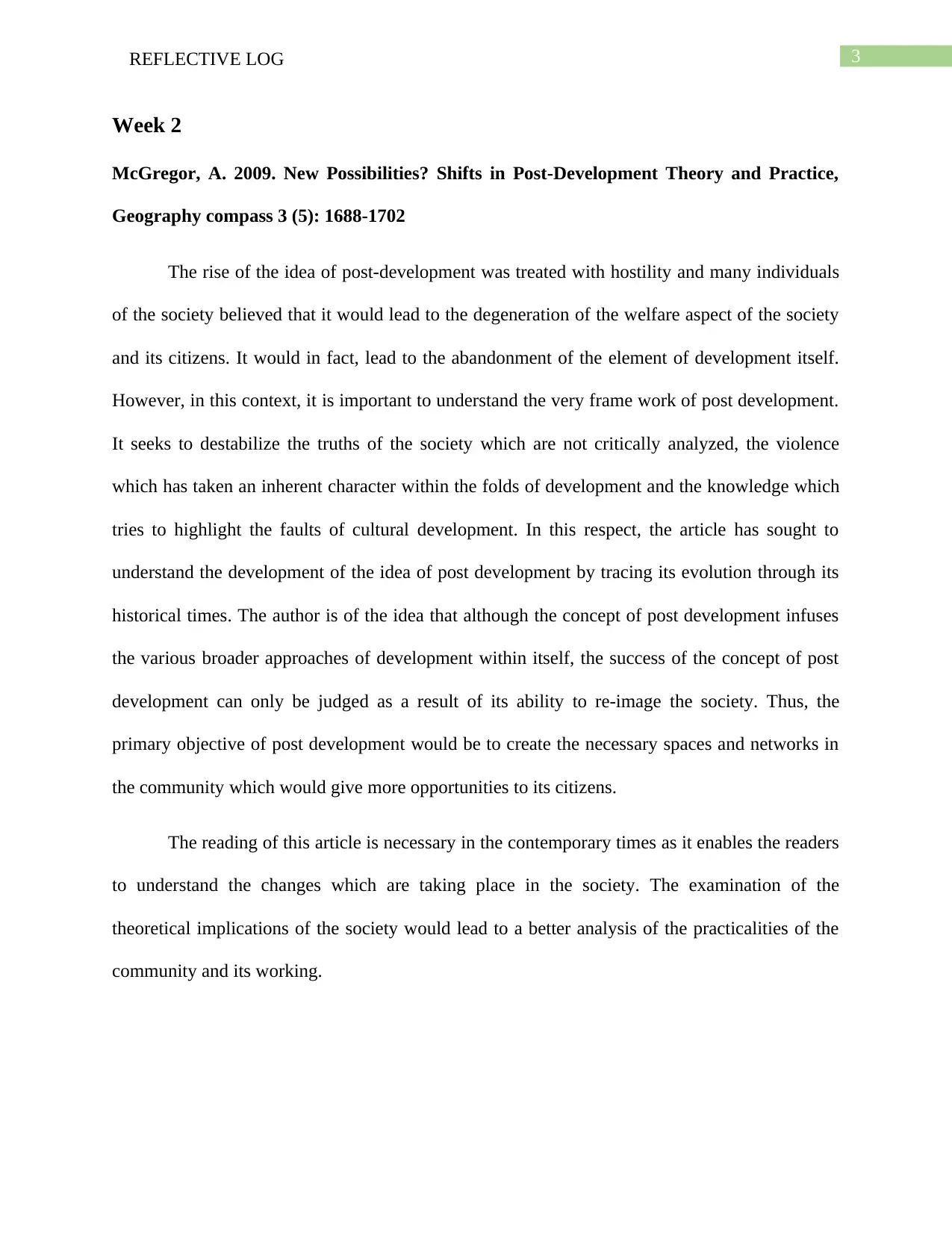
3REFLECTIVE LOG
Week 2
McGregor, A. 2009. New Possibilities? Shifts in Post-Development Theory and Practice,
Geography compass 3 (5): 1688-1702
The rise of the idea of post-development was treated with hostility and many individuals
of the society believed that it would lead to the degeneration of the welfare aspect of the society
and its citizens. It would in fact, lead to the abandonment of the element of development itself.
However, in this context, it is important to understand the very frame work of post development.
It seeks to destabilize the truths of the society which are not critically analyzed, the violence
which has taken an inherent character within the folds of development and the knowledge which
tries to highlight the faults of cultural development. In this respect, the article has sought to
understand the development of the idea of post development by tracing its evolution through its
historical times. The author is of the idea that although the concept of post development infuses
the various broader approaches of development within itself, the success of the concept of post
development can only be judged as a result of its ability to re-image the society. Thus, the
primary objective of post development would be to create the necessary spaces and networks in
the community which would give more opportunities to its citizens.
The reading of this article is necessary in the contemporary times as it enables the readers
to understand the changes which are taking place in the society. The examination of the
theoretical implications of the society would lead to a better analysis of the practicalities of the
community and its working.
Week 2
McGregor, A. 2009. New Possibilities? Shifts in Post-Development Theory and Practice,
Geography compass 3 (5): 1688-1702
The rise of the idea of post-development was treated with hostility and many individuals
of the society believed that it would lead to the degeneration of the welfare aspect of the society
and its citizens. It would in fact, lead to the abandonment of the element of development itself.
However, in this context, it is important to understand the very frame work of post development.
It seeks to destabilize the truths of the society which are not critically analyzed, the violence
which has taken an inherent character within the folds of development and the knowledge which
tries to highlight the faults of cultural development. In this respect, the article has sought to
understand the development of the idea of post development by tracing its evolution through its
historical times. The author is of the idea that although the concept of post development infuses
the various broader approaches of development within itself, the success of the concept of post
development can only be judged as a result of its ability to re-image the society. Thus, the
primary objective of post development would be to create the necessary spaces and networks in
the community which would give more opportunities to its citizens.
The reading of this article is necessary in the contemporary times as it enables the readers
to understand the changes which are taking place in the society. The examination of the
theoretical implications of the society would lead to a better analysis of the practicalities of the
community and its working.
Paraphrase This Document
Need a fresh take? Get an instant paraphrase of this document with our AI Paraphraser
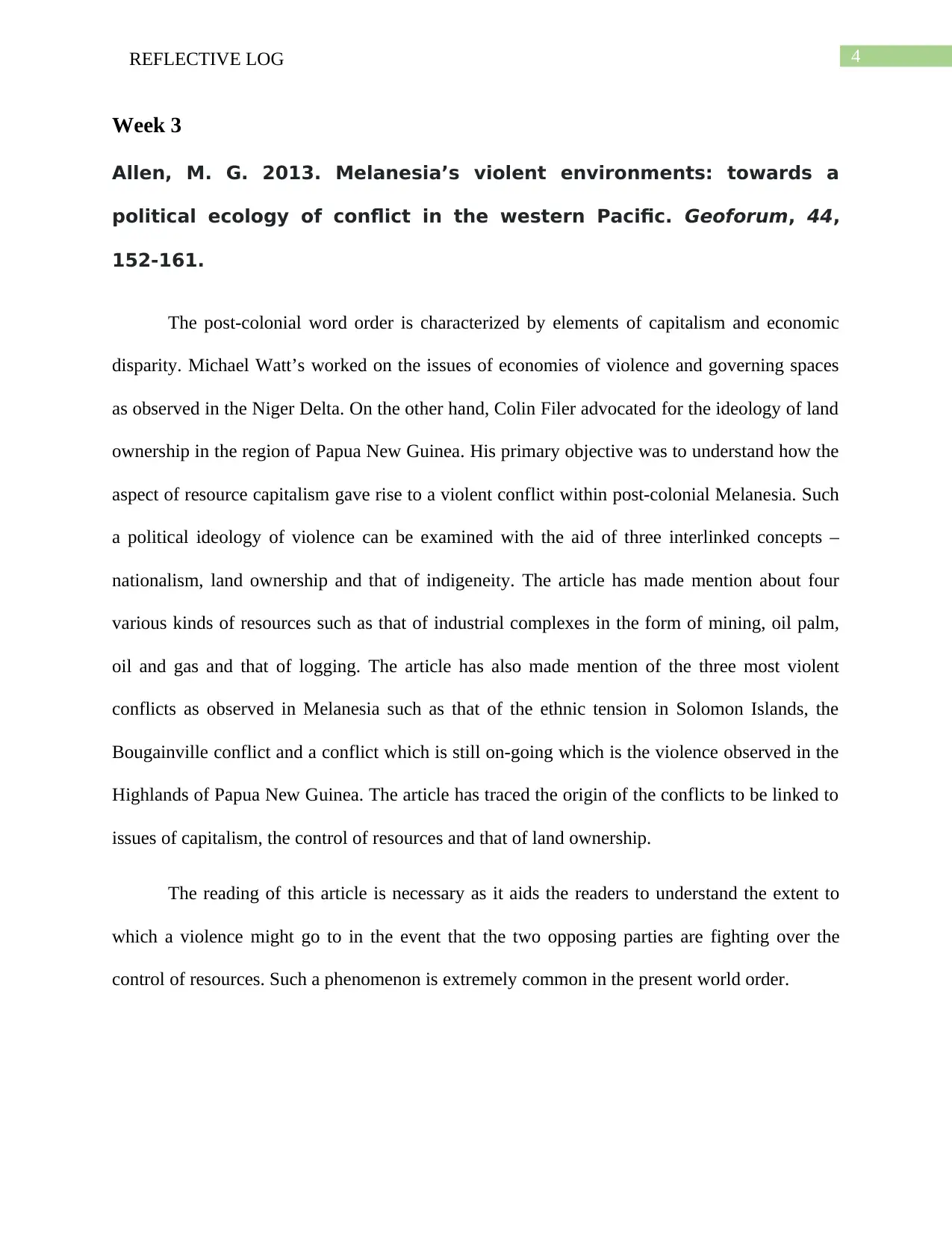
4REFLECTIVE LOG
Week 3
Allen, M. G. 2013. Melanesia’s violent environments: towards a
political ecology of conflict in the western Pacific. Geoforum, 44,
152-161.
The post-colonial word order is characterized by elements of capitalism and economic
disparity. Michael Watt’s worked on the issues of economies of violence and governing spaces
as observed in the Niger Delta. On the other hand, Colin Filer advocated for the ideology of land
ownership in the region of Papua New Guinea. His primary objective was to understand how the
aspect of resource capitalism gave rise to a violent conflict within post-colonial Melanesia. Such
a political ideology of violence can be examined with the aid of three interlinked concepts –
nationalism, land ownership and that of indigeneity. The article has made mention about four
various kinds of resources such as that of industrial complexes in the form of mining, oil palm,
oil and gas and that of logging. The article has also made mention of the three most violent
conflicts as observed in Melanesia such as that of the ethnic tension in Solomon Islands, the
Bougainville conflict and a conflict which is still on-going which is the violence observed in the
Highlands of Papua New Guinea. The article has traced the origin of the conflicts to be linked to
issues of capitalism, the control of resources and that of land ownership.
The reading of this article is necessary as it aids the readers to understand the extent to
which a violence might go to in the event that the two opposing parties are fighting over the
control of resources. Such a phenomenon is extremely common in the present world order.
Week 3
Allen, M. G. 2013. Melanesia’s violent environments: towards a
political ecology of conflict in the western Pacific. Geoforum, 44,
152-161.
The post-colonial word order is characterized by elements of capitalism and economic
disparity. Michael Watt’s worked on the issues of economies of violence and governing spaces
as observed in the Niger Delta. On the other hand, Colin Filer advocated for the ideology of land
ownership in the region of Papua New Guinea. His primary objective was to understand how the
aspect of resource capitalism gave rise to a violent conflict within post-colonial Melanesia. Such
a political ideology of violence can be examined with the aid of three interlinked concepts –
nationalism, land ownership and that of indigeneity. The article has made mention about four
various kinds of resources such as that of industrial complexes in the form of mining, oil palm,
oil and gas and that of logging. The article has also made mention of the three most violent
conflicts as observed in Melanesia such as that of the ethnic tension in Solomon Islands, the
Bougainville conflict and a conflict which is still on-going which is the violence observed in the
Highlands of Papua New Guinea. The article has traced the origin of the conflicts to be linked to
issues of capitalism, the control of resources and that of land ownership.
The reading of this article is necessary as it aids the readers to understand the extent to
which a violence might go to in the event that the two opposing parties are fighting over the
control of resources. Such a phenomenon is extremely common in the present world order.
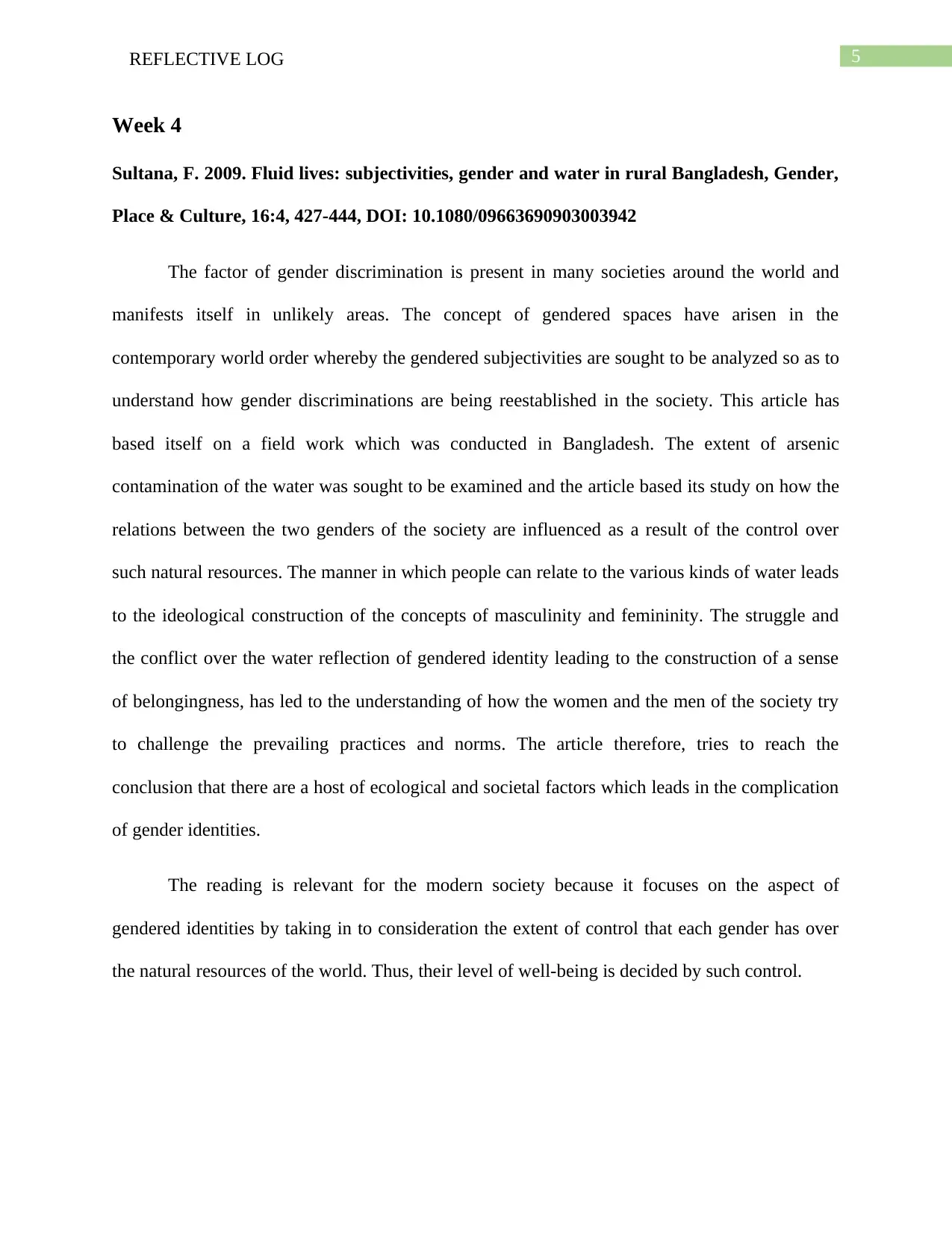
5REFLECTIVE LOG
Week 4
Sultana, F. 2009. Fluid lives: subjectivities, gender and water in rural Bangladesh, Gender,
Place & Culture, 16:4, 427-444, DOI: 10.1080/09663690903003942
The factor of gender discrimination is present in many societies around the world and
manifests itself in unlikely areas. The concept of gendered spaces have arisen in the
contemporary world order whereby the gendered subjectivities are sought to be analyzed so as to
understand how gender discriminations are being reestablished in the society. This article has
based itself on a field work which was conducted in Bangladesh. The extent of arsenic
contamination of the water was sought to be examined and the article based its study on how the
relations between the two genders of the society are influenced as a result of the control over
such natural resources. The manner in which people can relate to the various kinds of water leads
to the ideological construction of the concepts of masculinity and femininity. The struggle and
the conflict over the water reflection of gendered identity leading to the construction of a sense
of belongingness, has led to the understanding of how the women and the men of the society try
to challenge the prevailing practices and norms. The article therefore, tries to reach the
conclusion that there are a host of ecological and societal factors which leads in the complication
of gender identities.
The reading is relevant for the modern society because it focuses on the aspect of
gendered identities by taking in to consideration the extent of control that each gender has over
the natural resources of the world. Thus, their level of well-being is decided by such control.
Week 4
Sultana, F. 2009. Fluid lives: subjectivities, gender and water in rural Bangladesh, Gender,
Place & Culture, 16:4, 427-444, DOI: 10.1080/09663690903003942
The factor of gender discrimination is present in many societies around the world and
manifests itself in unlikely areas. The concept of gendered spaces have arisen in the
contemporary world order whereby the gendered subjectivities are sought to be analyzed so as to
understand how gender discriminations are being reestablished in the society. This article has
based itself on a field work which was conducted in Bangladesh. The extent of arsenic
contamination of the water was sought to be examined and the article based its study on how the
relations between the two genders of the society are influenced as a result of the control over
such natural resources. The manner in which people can relate to the various kinds of water leads
to the ideological construction of the concepts of masculinity and femininity. The struggle and
the conflict over the water reflection of gendered identity leading to the construction of a sense
of belongingness, has led to the understanding of how the women and the men of the society try
to challenge the prevailing practices and norms. The article therefore, tries to reach the
conclusion that there are a host of ecological and societal factors which leads in the complication
of gender identities.
The reading is relevant for the modern society because it focuses on the aspect of
gendered identities by taking in to consideration the extent of control that each gender has over
the natural resources of the world. Thus, their level of well-being is decided by such control.
⊘ This is a preview!⊘
Do you want full access?
Subscribe today to unlock all pages.

Trusted by 1+ million students worldwide
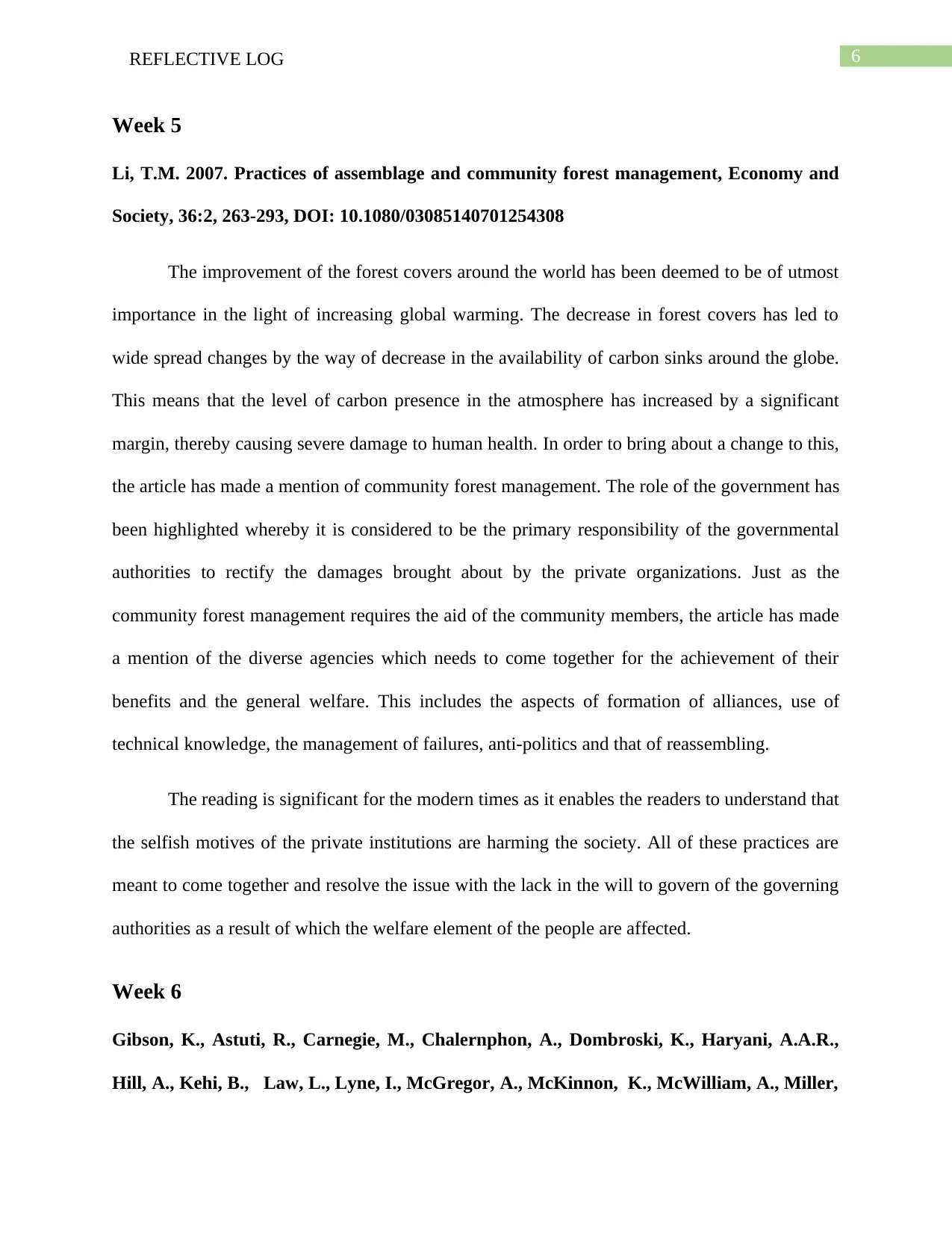
6REFLECTIVE LOG
Week 5
Li, T.M. 2007. Practices of assemblage and community forest management, Economy and
Society, 36:2, 263-293, DOI: 10.1080/03085140701254308
The improvement of the forest covers around the world has been deemed to be of utmost
importance in the light of increasing global warming. The decrease in forest covers has led to
wide spread changes by the way of decrease in the availability of carbon sinks around the globe.
This means that the level of carbon presence in the atmosphere has increased by a significant
margin, thereby causing severe damage to human health. In order to bring about a change to this,
the article has made a mention of community forest management. The role of the government has
been highlighted whereby it is considered to be the primary responsibility of the governmental
authorities to rectify the damages brought about by the private organizations. Just as the
community forest management requires the aid of the community members, the article has made
a mention of the diverse agencies which needs to come together for the achievement of their
benefits and the general welfare. This includes the aspects of formation of alliances, use of
technical knowledge, the management of failures, anti-politics and that of reassembling.
The reading is significant for the modern times as it enables the readers to understand that
the selfish motives of the private institutions are harming the society. All of these practices are
meant to come together and resolve the issue with the lack in the will to govern of the governing
authorities as a result of which the welfare element of the people are affected.
Week 6
Gibson, K., Astuti, R., Carnegie, M., Chalernphon, A., Dombroski, K., Haryani, A.A.R.,
Hill, A., Kehi, B., Law, L., Lyne, I., McGregor, A., McKinnon, K., McWilliam, A., Miller,
Week 5
Li, T.M. 2007. Practices of assemblage and community forest management, Economy and
Society, 36:2, 263-293, DOI: 10.1080/03085140701254308
The improvement of the forest covers around the world has been deemed to be of utmost
importance in the light of increasing global warming. The decrease in forest covers has led to
wide spread changes by the way of decrease in the availability of carbon sinks around the globe.
This means that the level of carbon presence in the atmosphere has increased by a significant
margin, thereby causing severe damage to human health. In order to bring about a change to this,
the article has made a mention of community forest management. The role of the government has
been highlighted whereby it is considered to be the primary responsibility of the governmental
authorities to rectify the damages brought about by the private organizations. Just as the
community forest management requires the aid of the community members, the article has made
a mention of the diverse agencies which needs to come together for the achievement of their
benefits and the general welfare. This includes the aspects of formation of alliances, use of
technical knowledge, the management of failures, anti-politics and that of reassembling.
The reading is significant for the modern times as it enables the readers to understand that
the selfish motives of the private institutions are harming the society. All of these practices are
meant to come together and resolve the issue with the lack in the will to govern of the governing
authorities as a result of which the welfare element of the people are affected.
Week 6
Gibson, K., Astuti, R., Carnegie, M., Chalernphon, A., Dombroski, K., Haryani, A.A.R.,
Hill, A., Kehi, B., Law, L., Lyne, I., McGregor, A., McKinnon, K., McWilliam, A., Miller,
Paraphrase This Document
Need a fresh take? Get an instant paraphrase of this document with our AI Paraphraser
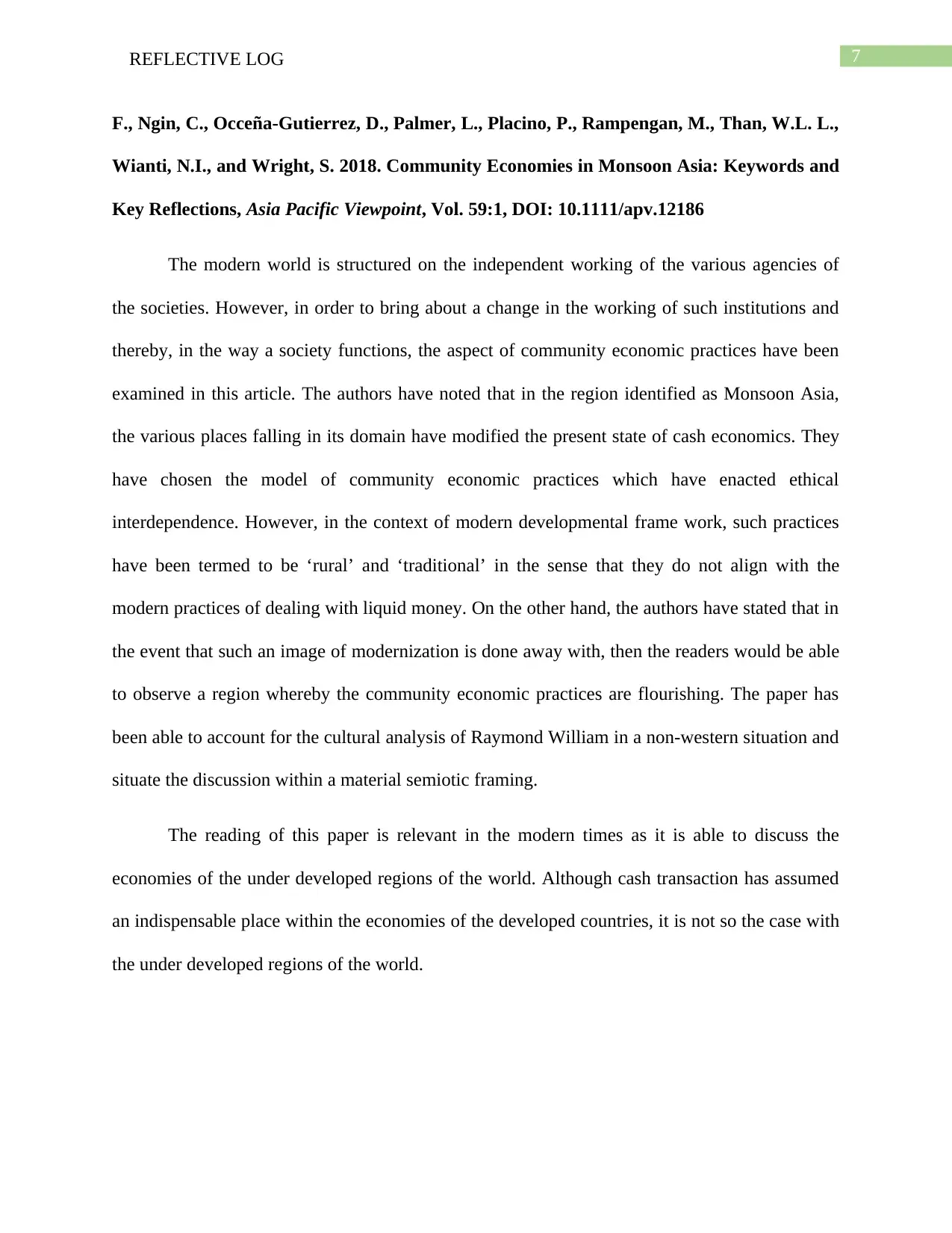
7REFLECTIVE LOG
F., Ngin, C., Occeña-Gutierrez, D., Palmer, L., Placino, P., Rampengan, M., Than, W.L. L.,
Wianti, N.I., and Wright, S. 2018. Community Economies in Monsoon Asia: Keywords and
Key Reflections, Asia Pacific Viewpoint, Vol. 59:1, DOI: 10.1111/apv.12186
The modern world is structured on the independent working of the various agencies of
the societies. However, in order to bring about a change in the working of such institutions and
thereby, in the way a society functions, the aspect of community economic practices have been
examined in this article. The authors have noted that in the region identified as Monsoon Asia,
the various places falling in its domain have modified the present state of cash economics. They
have chosen the model of community economic practices which have enacted ethical
interdependence. However, in the context of modern developmental frame work, such practices
have been termed to be ‘rural’ and ‘traditional’ in the sense that they do not align with the
modern practices of dealing with liquid money. On the other hand, the authors have stated that in
the event that such an image of modernization is done away with, then the readers would be able
to observe a region whereby the community economic practices are flourishing. The paper has
been able to account for the cultural analysis of Raymond William in a non-western situation and
situate the discussion within a material semiotic framing.
The reading of this paper is relevant in the modern times as it is able to discuss the
economies of the under developed regions of the world. Although cash transaction has assumed
an indispensable place within the economies of the developed countries, it is not so the case with
the under developed regions of the world.
F., Ngin, C., Occeña-Gutierrez, D., Palmer, L., Placino, P., Rampengan, M., Than, W.L. L.,
Wianti, N.I., and Wright, S. 2018. Community Economies in Monsoon Asia: Keywords and
Key Reflections, Asia Pacific Viewpoint, Vol. 59:1, DOI: 10.1111/apv.12186
The modern world is structured on the independent working of the various agencies of
the societies. However, in order to bring about a change in the working of such institutions and
thereby, in the way a society functions, the aspect of community economic practices have been
examined in this article. The authors have noted that in the region identified as Monsoon Asia,
the various places falling in its domain have modified the present state of cash economics. They
have chosen the model of community economic practices which have enacted ethical
interdependence. However, in the context of modern developmental frame work, such practices
have been termed to be ‘rural’ and ‘traditional’ in the sense that they do not align with the
modern practices of dealing with liquid money. On the other hand, the authors have stated that in
the event that such an image of modernization is done away with, then the readers would be able
to observe a region whereby the community economic practices are flourishing. The paper has
been able to account for the cultural analysis of Raymond William in a non-western situation and
situate the discussion within a material semiotic framing.
The reading of this paper is relevant in the modern times as it is able to discuss the
economies of the under developed regions of the world. Although cash transaction has assumed
an indispensable place within the economies of the developed countries, it is not so the case with
the under developed regions of the world.
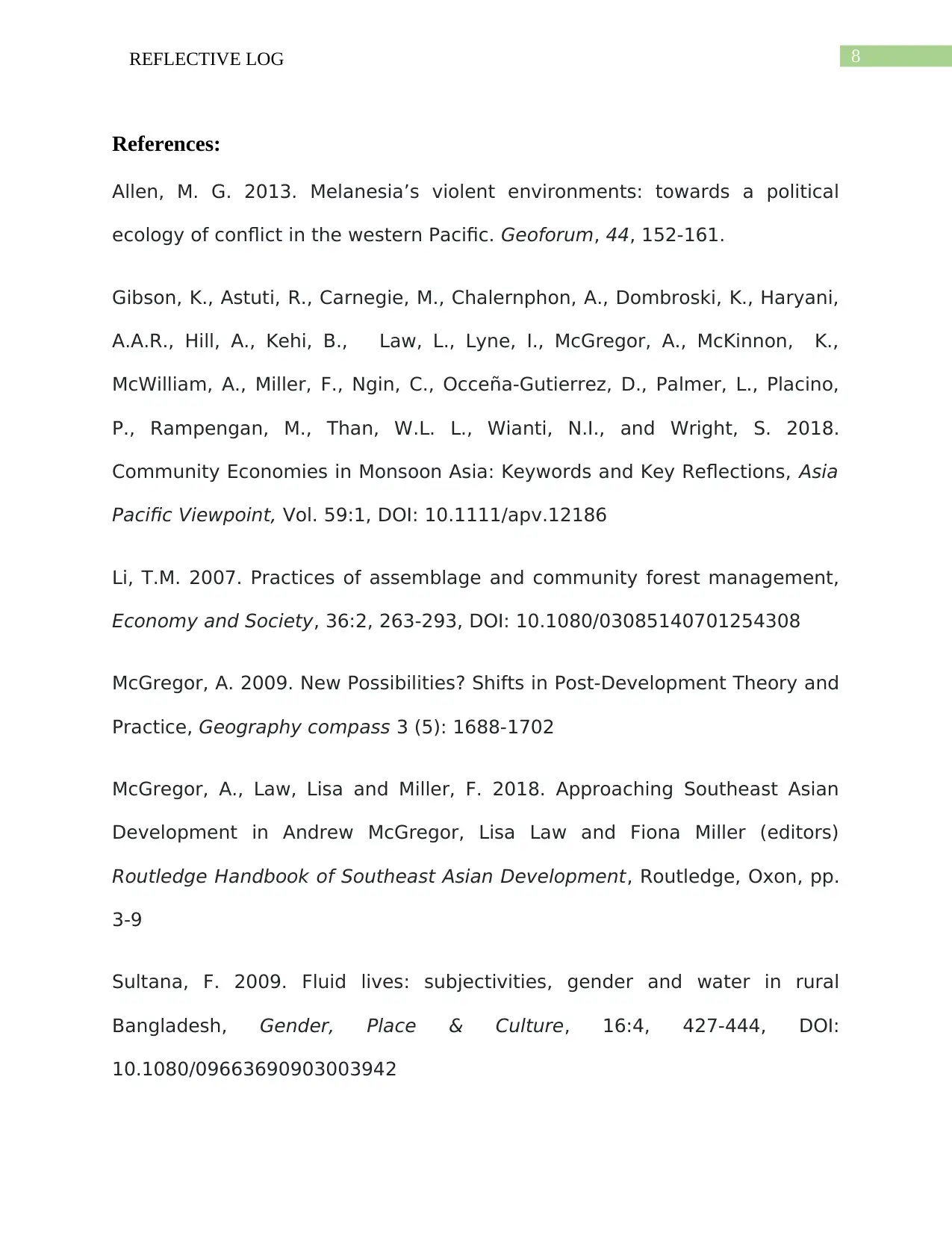
8REFLECTIVE LOG
References:
Allen, M. G. 2013. Melanesia’s violent environments: towards a political
ecology of conflict in the western Pacific. Geoforum, 44, 152-161.
Gibson, K., Astuti, R., Carnegie, M., Chalernphon, A., Dombroski, K., Haryani,
A.A.R., Hill, A., Kehi, B., Law, L., Lyne, I., McGregor, A., McKinnon, K.,
McWilliam, A., Miller, F., Ngin, C., Occeña-Gutierrez, D., Palmer, L., Placino,
P., Rampengan, M., Than, W.L. L., Wianti, N.I., and Wright, S. 2018.
Community Economies in Monsoon Asia: Keywords and Key Reflections, Asia
Pacific Viewpoint, Vol. 59:1, DOI: 10.1111/apv.12186
Li, T.M. 2007. Practices of assemblage and community forest management,
Economy and Society, 36:2, 263-293, DOI: 10.1080/03085140701254308
McGregor, A. 2009. New Possibilities? Shifts in Post-Development Theory and
Practice, Geography compass 3 (5): 1688-1702
McGregor, A., Law, Lisa and Miller, F. 2018. Approaching Southeast Asian
Development in Andrew McGregor, Lisa Law and Fiona Miller (editors)
Routledge Handbook of Southeast Asian Development, Routledge, Oxon, pp.
3-9
Sultana, F. 2009. Fluid lives: subjectivities, gender and water in rural
Bangladesh, Gender, Place & Culture, 16:4, 427-444, DOI:
10.1080/09663690903003942
References:
Allen, M. G. 2013. Melanesia’s violent environments: towards a political
ecology of conflict in the western Pacific. Geoforum, 44, 152-161.
Gibson, K., Astuti, R., Carnegie, M., Chalernphon, A., Dombroski, K., Haryani,
A.A.R., Hill, A., Kehi, B., Law, L., Lyne, I., McGregor, A., McKinnon, K.,
McWilliam, A., Miller, F., Ngin, C., Occeña-Gutierrez, D., Palmer, L., Placino,
P., Rampengan, M., Than, W.L. L., Wianti, N.I., and Wright, S. 2018.
Community Economies in Monsoon Asia: Keywords and Key Reflections, Asia
Pacific Viewpoint, Vol. 59:1, DOI: 10.1111/apv.12186
Li, T.M. 2007. Practices of assemblage and community forest management,
Economy and Society, 36:2, 263-293, DOI: 10.1080/03085140701254308
McGregor, A. 2009. New Possibilities? Shifts in Post-Development Theory and
Practice, Geography compass 3 (5): 1688-1702
McGregor, A., Law, Lisa and Miller, F. 2018. Approaching Southeast Asian
Development in Andrew McGregor, Lisa Law and Fiona Miller (editors)
Routledge Handbook of Southeast Asian Development, Routledge, Oxon, pp.
3-9
Sultana, F. 2009. Fluid lives: subjectivities, gender and water in rural
Bangladesh, Gender, Place & Culture, 16:4, 427-444, DOI:
10.1080/09663690903003942
⊘ This is a preview!⊘
Do you want full access?
Subscribe today to unlock all pages.

Trusted by 1+ million students worldwide

9REFLECTIVE LOG
1 out of 10
Your All-in-One AI-Powered Toolkit for Academic Success.
+13062052269
info@desklib.com
Available 24*7 on WhatsApp / Email
![[object Object]](/_next/static/media/star-bottom.7253800d.svg)
Unlock your academic potential
Copyright © 2020–2026 A2Z Services. All Rights Reserved. Developed and managed by ZUCOL.